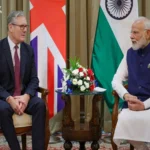India’s Strategic Calculus Misfires on the Global Stage
Following the April 22 Pahalgam incident, India swiftly adopted an aggressive narrative, accusing Pakistan of orchestrating the attack through cross-border terrorism. The move was not just reactive but aligned with a broader strategic doctrine under the BJP-led government, aimed at redefining India’s role in South Asia and asserting itself as the region’s dominant power.
New Delhi anticipated strong backing from its global allies—especially the United States—based on its growing strategic weight in the Indo-Pacific, participation in the Quad, and its perceived role as a counterbalance to China. Concurrently, Pakistan was seen as diplomatically isolated, internally unstable, and heavily reliant on Beijing, which further emboldened India’s stance.
However, despite this calculated escalation, India was met with a surprising lack of diplomatic reinforcement. Key international actors chose caution over alignment, signaling a strategic reluctance to support New Delhi’s confrontational tone without concrete evidence.
Washington Sends Mixed Signals Amid Regional Tensions
India’s hopes for unequivocal support from the United States were quickly tempered. While initial optimism followed the timing of US Vice President JD Vance’s visit, President Trump’s indifferent response marked a sharp departure from past US administrations that often warned of nuclear flashpoints in South Asia.
Statements from senior US officials, including Under Secretary of Defence Elbridge Colby, avoided direct references to Pakistan or the Pahalgam attack. Instead, they focused on general bilateral cooperation, aligning with the US Indo-Pacific strategy rather than endorsing India’s specific claims.
Efforts to de-escalate were evident. Secretary of State Marco Rubio engaged both Indian and Pakistani leadership, emphasizing restraint and cooperation. Indian Defence Minister Rajnath Singh’s claim that US Defense Secretary Pete Hegseth endorsed India’s right to self-defence was not reflected in the official readout, which omitted any reference to the attack or regional instability.
While Washington remained sympathetic to India’s concerns, it refrained from offering a green light for retaliatory action. Experts noted that the US views India’s security challenge as complex and lacking a clear military solution. At the same time, the US applied subtle pressure on Pakistan, encouraging participation in investigations and stronger condemnation of the attack—without endorsing New Delhi’s framing.
This cautious approach mirrored growing frustration in Washington over India’s neutral stance on the Ukraine war, its energy trade with Russia, and its reluctance to align fully with Western objectives.
Global South Stays Guarded: China and Gulf States Emphasize Restraint
China adopted a balanced public tone, labeling the Pahalgam incident a “terrorist attack” while urging restraint. This reflected efforts to maintain stability along the disputed Line of Actual Control with India. However, behind the scenes, Beijing remained firmly aligned with Pakistan—supporting its call for an independent investigation and continuing strong military cooperation.
The Gulf states also avoided taking sides. Despite deep economic links with India, countries like Saudi Arabia, the UAE, and Qatar issued neutral statements focused on de-escalation. Their responses were driven more by self-interest than diplomacy: Saudi Arabia seeks regional calm for its Vision 2030 agenda, the UAE maintains ties with both Indian and Pakistani populations, and Qatar upholds its mediator role in global conflicts.
India’s failure to secure broader diplomatic support underscores a turning point in regional geopolitics. Unlike the 2019 Pulwama incident, where sympathy flowed more freely, today’s global actors appear less willing to accept India’s claims without concrete proof—especially as international media and analysts demand transparency and evidence.
Former Ambassador Masood Khan summed it up aptly: “There is a rethink going on in Washington. India has been riding on the back of the US without any reciprocity.” He added, “By now they know India is playing them and would not do their bidding in the region.”








